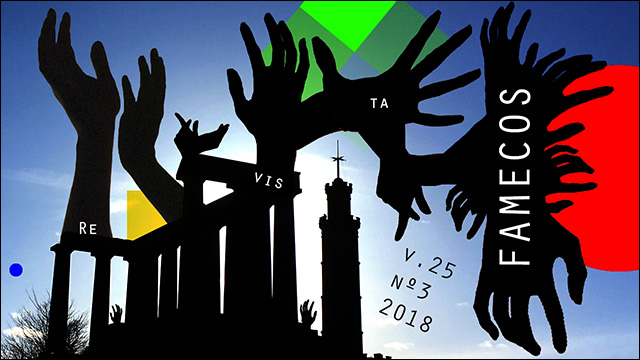Citizen as Sensor and Smart City: Bahia's Mobile Apps Analysis
DOI:
https://doi.org/10.15448/1980-3729.2018.3.28708Keywords:
Mobile Applications. Smart City. Smart Citizen.Abstract
The paper aims to show an exploratory research about the use of mobile applications by the State of Bahia and the Municipality of Salvador, Bahia's capital, Brazil. It seeks to identify how they are materially configured, their functionality, and structures. The results are subdivided into three main aspects: 1) An overview of services and functions; 2) Planning: how the applications are managed and understanding by the government and the city hall and 3) Monitoring: how the governments control the use of the mobile applications. At stake is an idea of a smart citizen, as an information provider to the public authorities.Downloads
References
ALBINO, V.; BERARDI, U.; DANGELICO, R. M. Smart Cities: Definitions, Dimensions, Performance, and Initiatives. Journal of Urban Technology, 2015, Vol. 22, No. 1, 3–21. Disponível em: http://dx.doi.org/10.1080/10630732.2014.942092
BOUSKELA, M (et al). Caminho para as Smart Cities: da gestão tradicional para a cidade inteligente. BID, 2016.
DINIZ et al. O governo eletrônico no Brasil: perspectiva histórica a partir de um modelo estruturado de análise. Revista de Administração Pública – RAP. Rio de janeiro. Nº 43, V. 1. , p. 23-48, jan./fev. 2009.
DUARTE, Jorge. (Org.). Comunicação Pública: estado, mercado, sociedade e interesse público. 2. ed. São Paulo: Atlas, 2009.
HASWANI, Mariângela. F. Comunicação Pública: bases e abrangências. São Paulo: Saraiva, 2013.
LIMA, C. C. B. de. M-Government: Limits and Possibilities for the Use of Mobile Apps as a Citizenship Tool in Brazil. Icegov '17: Proceedings of the 10th International Conference on Theory and Practice of Electronic Governance. New Delhi AA, India — March 07 - 09, 201.
KITCHIN, R. Reframing, reimaging and remaking smart cities. This short paper was written as an introductory framing essay for the ‘Creating smart cities’ workshop to be hosted by the Programmable City project at Maynooth University, Ireland, 5- 6 . September 2016.
LEMOS, A. Smart Cities, internet of things and performative sensibility. Brief analysis on Glasgow, Curitiba and Bristol’s Initiatives. In: P2P & Inovação, Rio de Janeiro, v. 3 n. 2, p. 80-95, Mar./ Set. 2017
LEMOS, A., SOLAREVISKY, R. Salvador, Cidade Inteligente? Comunicação e invisibilidade em experiências de IoT na capital baiana. No prelo.
NAM, T; PARDO, T. A. Conceptualizing Smart City with Dimensions of Technology, People, and Institutions. The Proceedings of the 12th Annual International Conference on Digital Government Research, 2014.
OECD. M-Government: mobile technologies for responsive governments and connected societies, 2011.
SCRUGGS, Gregory. The ‘new urban citizen’ and the dangers of the measurable city. Cityscope. August 25, 2017. Disponível em: https://goo.gl/Kq29Ff . Acesso em 25 de agosto de 2017.
WENDY LI. Government and Mobile: A Gear Change? In: LANZA, Beatriz Barreto; CUNHA, Maria Alexandra Cunha (Orgs.). Human Social Interaction in the Age of Mobile Devices, 2016 (p.133-149).
ZÉMOR, Pierre. La Communication Publique. PUF, COL, Que sais-je? Paris, 1995.
Downloads
Published
How to Cite
Issue
Section
License
Copyright
The submission of originals to Revista Famecos implies the transfer by the authors of the right for publication. Authors retain copyright and grant the journal right of first publication. If the authors wish to include the same data into another publication, they must cite Revista Famecos as the site of original publication.
Creative Commons License
Except where otherwise specified, material published in this journal is licensed under a Creative Commons Attribution 4.0 International license, which allows unrestricted use, distribution and reproduction in any medium, provided the original publication is correctly cited.






